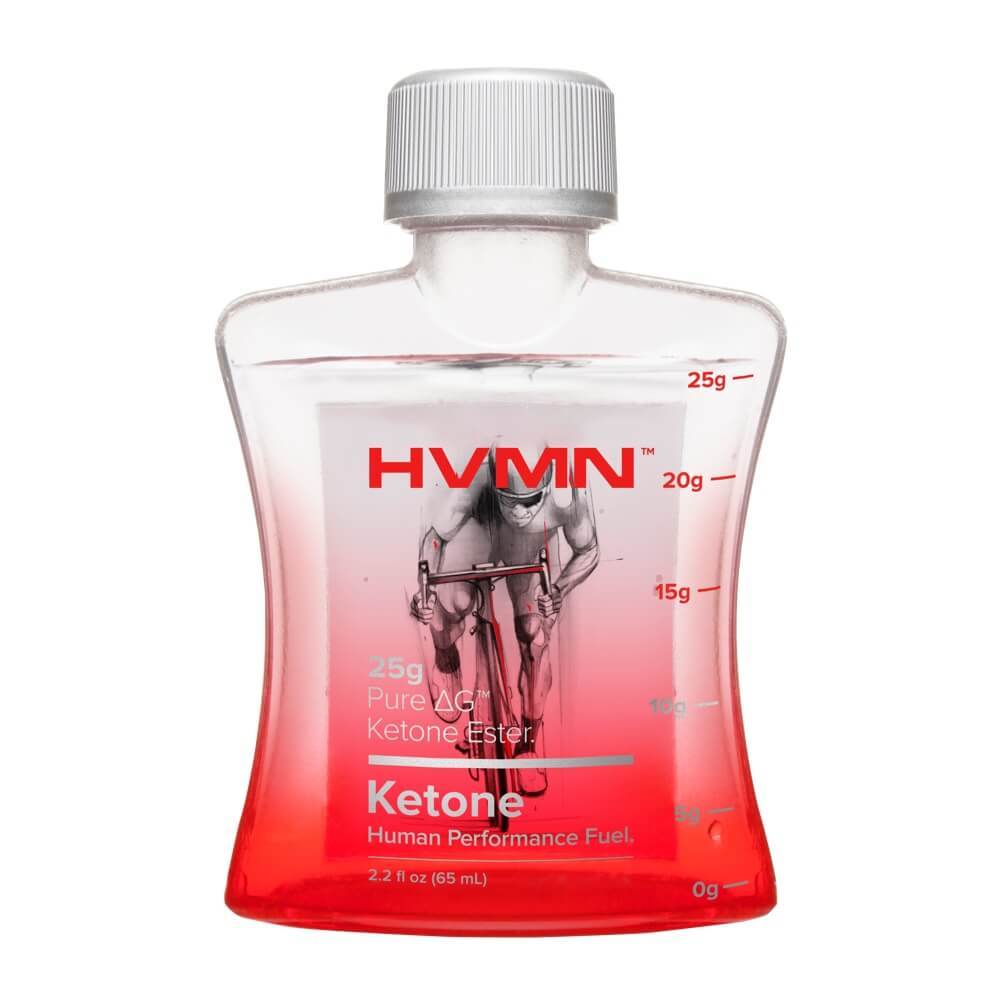Development of deltaG™
She also works on the effects of diet on energy metabolism in heart, brain and skeletal muscle, and thereby on physical performance and cognitive function. Specifically, her work has led to the development of a fourth food group, a ketone ester called deltaG™, that improves endurance performance and could be used for the management of common metabolic diseases, such as type 2 diabetes and Alzheimer’s disease. deltaG™ also has topical uses, such as for prevention of wrinkles and other signs of sun damage by providing nutrition to prevent skin cell death.
Ketones – do they work?
In order for humans to survive starvation, ketones are made in the liver from mobilised body fat. Normally, in well-fed athletes on a balanced diet, carbs and fat are fuels metabolised to produce energy for exercising muscles; the amount of each used depending on the type of exercise. When the body doesn’t get enough fuel from food, internal fat stores are broken down to make ketones, mainly to feed the brain.
TdeltaS have developed a drink, that allows muscle to generate energy from ketones in addition to carbs and fat.
A single ketone drink allowed highly trained cyclists to add up to 400 meters of distance in a 30-minute time trial.
Here's a link to a video about sports performance using TΔS.
Here's a link to Brianna Stubbs, who features in that video, with Prof. Clarke.
A ketone supplement or a ketogenic (high fat/low carb diet) may benefit endurance exercise. To demonstrate that the biochemistry of fuel and energy metabolism in muscle has to be understood.
HVMN Ketone
Preorder Today | Ships Early 2018

A drink developed for soldiers to generate energy from ketones rather than carbs or fat allowed highly trained cyclists to add up to 400 meters of distance to their workouts.
'The ketone itself is inhibiting glycolysis, so that with the same exercise you're preserving glycogen and producing much less lactic acid - this hasn't been seen before,' Professor Clarke said. 'What may be happening is if you are doing something that isn't a sprint, like a marathon, you won't hit the wall as quickly. Not only that, but it stops you from aching afterwards.'
While a good fit for marathon runners, the ketone drink is unlikely to help many Olympic athletes or sprinters, she says, because their exercise is primarily anaerobic, and the body needs oxygen to burn ketones.
Professor Kieran Clarke
Kieran Clarke, Oxford University professor of physiology and biochemistry.

Prof. Clarke writes:
 My own research is focussed on the effect on physical performance and cognitive function of mild ketosis. During periods of stress, elevated catecholamines, steroids and cytokines increase the metabolism of stored fat in the body. The increase in circulating free fatty acids causes insulin resistance, decreases skeletal and cardiac muscular efficiency and may decrease metabolic fuel for the brain, which cannot metabolize fat, but can metabolize ketones.
My own research is focussed on the effect on physical performance and cognitive function of mild ketosis. During periods of stress, elevated catecholamines, steroids and cytokines increase the metabolism of stored fat in the body. The increase in circulating free fatty acids causes insulin resistance, decreases skeletal and cardiac muscular efficiency and may decrease metabolic fuel for the brain, which cannot metabolize fat, but can metabolize ketones.
Ketone bodies contain more recoverable metabolic energy than fatty acids and yield 28% more energy on combustion than glucose. We are testing whether the negative effects of elevated free fatty acids can be overcome by mild ketosis using a diet containing ketone bodies.
The idea to develop a ketone food group came from the Defense Advanced Research Projects Agency (DARPA), the research branch of the United States army, who put out a $10 million call for the development of the most efficient food for soldiers to take onto a battlefield.
Through this work, Kieran has collaborated over many years, since 1993, with Dr. Richard Veech at the NIH in the USA. On both sides of the Atlantic, efforts to commercialise the technology of which produces non-racemic ketone esters, is being developed. Testing by elite athletes is well underway. Dr Clarke's spin-off company, TΔS is here. In November 2017. the HVMN Ketone Ester was released and is being supplied to elite athletes to enhance training and recovery and to boost race-day performance. Safety studies have already been conducted and the drink does not have any adverse effects. HVMN Ketone Ester has been approved as a food, and is not considered a performance boosting supplement or drug.
We are also testing the metabolic mechanism underlying the effects of the ketone body diet on exercise, endurance and cognitive function. We tested in rats using treadmill exercise and a maze test. Each of these characteristics were increased by the ketosis. We have further tested the ketone diet during endurance exercise, in a blinded placebo-controlled cross-over studies of rowing and cycling in elite athletes. Exercise, cognitive function and skeletal and cardiac muscle energetics were followed using non-invasive MRI of brain and muscle during exercise.
The ketogenic diet can also be used to treat metabolic diseases, such as obesity, Alzheimer’s and Parkinson’s diseases. Such studies have started recently.
More recently, basic science from our department has helped to change therapy for patients with neonatal diabetes and to improve the performance of endurance athletes. Today, our studies remain directed at understanding basic physiological mechanisms, how these are impaired in disease, with the ultimate goal of creating new therapeutic approaches to disease.
 |
| Students and staff of the Cardiac Metabolism Research Group, Oxford University, 2016 |
|---|
A Very Important Research Paper:
Acute nutritional ketosis: implications for exercise performance and metabolism. Ketone bodies acetoacetate (AcAc) and D-ß-hydroxybutyrate (ßHB) may provide an alternative carbon source to fuel exercise when delivered acutely in nutritional form.
A few more Research Papers: (All but one include Dr Veech as a co-author.)
A ketone ester diet exhibits anxiolytic and cognition-sparing properties, and lessens amyloid and tau pathologies in a mouse model of Alzheimer's disease. Alzheimer's disease (AD) involves progressive accumulation of amyloid ß-peptide (Aß) and neurofibrillary pathologies, and glucose hypometabolism in brain regions critical for memory. Ketone-ester-fed mice exhibited reduced levels of hyperphosphorylated tau deposition in the same regions of the hippocampus, amygdala, and cortex. Thus, a ketone ester can ameliorate proteopathic and behavioral deficits in a mouse AD model. © 2013
Cardiac metabolism in a new rat model of type 2 diabetes using high-fat diet with low dose streptozotocin. High-fat feeding in combination with a low dose of STZ induced cardiac metabolic changes that mirror the decrease in glucose metabolism and increase in fat metabolism in diabetic patients, demonstrating that the severity of diabetes can be modified.
Nutritional Ketosis Alters Fuel Preference and Thereby Endurance Performance in Athletes. we studied the biochemical advantages of ketosis in humans using a ketone ester-based form of nutrition without the unwanted milieu of endogenous ketone body production by caloric or carbohydrate restriction. In five separate studies of 39 high-performance athletes, we show how this unique metabolic state improves physical endurance by altering fuel competition for oxidative respiration. These findings may hold clues to greater human potential and a better understanding of fuel metabolism in health and disease.
Novel ketone diet enhances physical and cognitive performance. Ketone bodies are the most energy-efficient fuel and yield more ATP per mole of substrate than pyruvate and increase the free energy released from ATP hydrolysis. Elevation of circulating ketones via high-fat, low-carbohydrate diets has been used for the treatment of drug-refractory epilepsy and for neurodegenerative diseases, such as Parkinson's disease. Ketones may also be beneficial for muscle and brain in times of stress, such as endurance exercise. The novel ketone diet, therefore, improved physical performance and cognitive function in rats, and its energy-sparing properties suggest that it may help to treat a range of human conditions with metabolic abnormalities.
